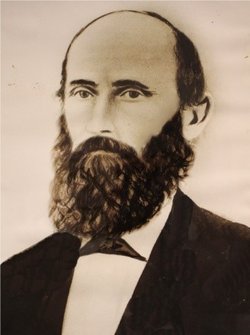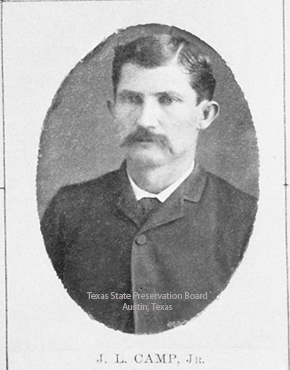Col. John Lafayette Camp, Sr.
John Lafayette Camp, Jr.
CAMP, JOHN LAFAYETTE (1828-1891)
John Lafayette Camp, soldier and political leader, was born on February 20, 1828, near Birmingham, Alabama, the son of John Lafayette and Elizabeth (Brown) Camp. In 1848 he graduated from the University of Tennessee, and the following year he moved to Gilmer, Upshur County, Texas. There he taught school, became a prosperous cotton planter, and established himself as one of the leading attorneys of East Texas. In 1851 he married Mary Ann Ward, the daughter of William Ward, a well-known physician. The couple eventually had five children.
When the Civil War began, Camp was first elected captain of a company and then colonel of the Fourteenth Texas Cavalry. The regiment served in Texas and Arkansas in the early months of the war but was later transferred east of the Mississippi River to the Confederate Army of Tennessee. There the regiment was consolidated with the Tenth Texas Cavalry, Dismounted, and assigned to Mathew D. Ector's brigade. Camp saw action at the battles of Richmond and Cumberland Gap, Kentucky; Murfreesboro (Stone's River), Tennessee; and Chickamauga and Altoona, Georgia. He was twice wounded and twice captured.In 1866 he was elected to the United States House of Representatives from the First District of Texas but was not permitted to take his seat. He served as a delegate to the Constitutional Convention of 1866, where he was an advocate of presidential Reconstruction. In 1872, as a delegate to the national Democratic party convention, he favored cooperation with the liberal wing of the Republican party. In 1874 he was elected to the Texas Senate, where he sponsored railroad construction in order to encourage the settlement of West Texas. He was also a firm supporter of constitutional reform and, with two members of the Texas House of Representatives, formed a committee that drafted a proposed new constitution for the state.
In 1878 Governor Richard B. Hubbard appointed Camp judge of the district comprising Jefferson, Marshall, Palestine, and Tyler, and in 1884, hoping that the change of climate would improve Camp's health, President Grover Cleveland appointed him registrar of the land office in Arizona. His health continued to decline, however, and Camp resigned after two years to return to Texas. He settled in San Antonio, where he died on July 16, 1891. He was the father of John Lafayette Camp, Jr. Camp County in northeast Texas is named in his honor.
CAMP, JOHN LAFAYETTE, JR. (1855-1918)
John Lafayette Camp, Jr., judge, was born on September 23, 1855, in Gilmer, Texas, the son of Mary Ann (Ward) and John Lafayette Camp. After graduating from the Gilmer Academy, Texas Military Institute (San Antonio), and Trinity University he served in the Texas Senate from 1887 to 1891 and then moved to San Antonio, where he established a legal practice. In 1897 Governor Charles Allen Culberson appointed Camp judge of the Forty-fifth District Court. He continued to be reelected for seventeen years, usually without opposition. Among his most notable decisions was that which enabled the preservation of the Alamo chapel. "Care and custody" of the shrine had been granted to the Daughters of the Republic of Texas by a state law of 1905. In 1912, however, the state legislature, at the prompting of Governor Oscar Branch Colquitt, appropriated $5,000 to "improve" the Alamo. Colquitt's true intention was to turn the Alamo into a state park. When the DRT filed suit to halt the dismantling of the historic structure, Camp ruled that the 1912 law had not overturned that of 1905 and that the Daughters maintained custody of the property. An appellate court concurred.
In 1913 President Woodrow Wilson appointed Camp United States district attorney for western Texas. In that position he was chiefly responsible for the arrest, on June 27, 1915, of former Mexican president Victoriano Huerta for the violation of United States neutrality laws. Huerta was released on bond but rearrested on July 3 and confined at Fort Bliss, where he died six months later. In 1916, when Judge Thomas Sheldon Maxey retired from the bench, the eighteen Texas representatives and two senators endorsed Camp as his successor as federal judge of West Texas, but President Wilson demurred, thinking that no one over the age of sixty should hold such a position. Wilson did, however, appoint Camp to a second term as district attorney.In 1881 Camp married Lamartine Felder, the daughter of J. L. Felder, a Leesburg physician. Camp died in San Antonio on August 10, 1918. He was survived by his wife, five daughters, and two sons.
Copyright © 2015 - Present TXGenWeb




